
San Saba is an ancient basilica church in Rome, Italy. It lies on the so-called Piccolo Aventino, which is an area close to the ancient Aurelian Walls next to the Aventine Hill and Caelian Hill.

The Church of St. Ignatius of Loyola at Campus Martius is a Latin Catholic titular church, of deaconry rank, dedicated to Ignatius of Loyola, the founder of the Society of Jesus, located in Rome, Italy. Built in Baroque style between 1626 and 1650, the church functioned originally as the chapel of the adjacent Roman College, which moved in 1584 to a new larger building and was renamed the Pontifical Gregorian University.

The Church of the Gesù is the mother church of the Society of Jesus (Jesuits), a Catholic religious order. Officially named Chiesa del Santissimo Nome di Gesù, its façade is "the first truly baroque façade", introducing the baroque style into architecture. The church served as a model for innumerable Jesuit churches all over the world, especially in the central Europe and then in the Portuguese colonies. Its paintings in the nave, crossing, and side chapels became models for Jesuit churches throughout Italy and Europe, as well as those of other orders. The Church of the Gesù is located in the Piazza del Gesù in Rome.
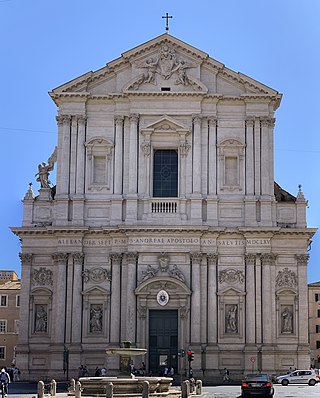
Sant'Andrea della Valle is a minor basilica in the rione of Sant'Eustachio of the city of Rome, Italy. The basilica is the general seat for the religious order of the Theatines. It is located at Piazza Vidoni, at the intersection of Corso Vittorio Emanuele and Corso Rinascimento.

Sant'Ambrogio e Carlo al Corso is a basilica church in Rome, Italy, facing onto the central part of the Via del Corso. The apse of the church faces across the street, the Mausoleum of Augustus on Via di Ripetta.

The church of Saint Agnes Outside the Walls is a titular church, a minor basilica in Rome, on a site sloping down from the Via Nomentana, which runs north-east out of the city, still under its ancient name. What are said to be the remains of Saint Agnes are below the high altar. The church is built over the Catacombs of Saint Agnes, where the saint was originally buried, and which may still be visited from the church. A large basilica with the same name was built nearby in the 4th century and its ruins can be seen near Santa Costanza, in the same site. The existing church was built by Pope Honorius I in the 7th century, and largely retains its original structure, despite many changes to the decoration. In particular the mosaic in the apse of Agnes, Honorius, and another Pope is largely in its original condition. The current Cardinal Priest of the Titulus S. Agnetis Extra moenia is Camillo Ruini.

Santi Nereo ed Achilleo is a fourth-century basilica church in Rome, Italy, located in via delle Terme di Caracalla in the rione Celio facing the main entrance to the Baths of Caracalla. It has been the titular church of Cardinal Celestino Aós Braco since 28 November 2020.

The Basilica of Saint Sylvester the First, also known as, is a Roman Catholic minor basilica and titular church in Rome dedicated to Pope Sylvester I. It is located on the Piazza San Silvestro, at the corner of Via del Gambero and the Via della Mercede, and stands adjacent to the central Post Office.

Santa Francesca Romana, previously known as Santa Maria Nova, is a Catholic church situated next to the Roman Forum in the rione Campitelli in Rome, Italy.
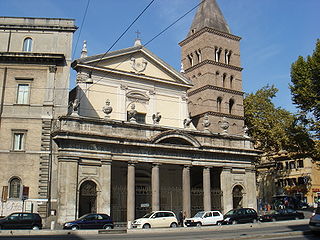
San Crisogono is a church in Rome dedicated to the martyr Saint Chrysogonus. It was one of the tituli, the first parish churches of Rome, and was probably built in the 4th century under Pope Sylvester I (314–335).
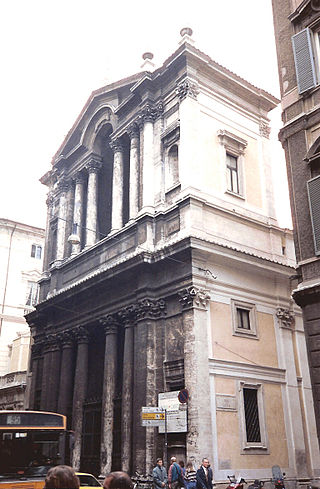
Santa Maria in Via Lata is a church on the Via del Corso, in Rome, Italy. It stands diagonal from the church of San Marcello al Corso.
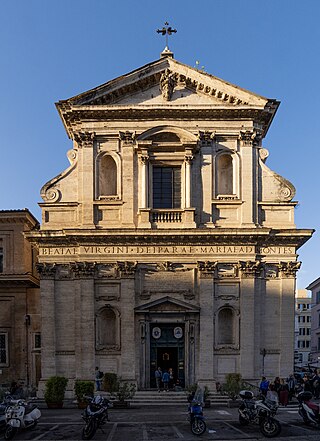
Santa Maria dei Monti is a cardinalatial titular church, located at 41 Via della Madonna dei Monti, at the intersection with Via dei Serpenti, in the rione Monti of Rome, Italy. The church is dedicated to the Blessed Virgin Mary.

The Church of Saint Alphonus of Liguori is a rectory church located on the Via Merulana on the Esquiline Hill of central Rome's Vth prefecture, Italy, and a titular church for a Cardinal-priest under the name Santissimo Redentore e Sant'Alfonso in Via Merulana.
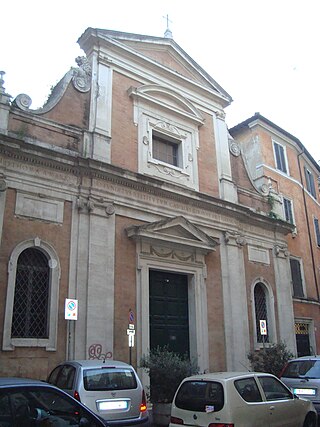
San Tommaso in Parione is one of the two national churches of Eritrea in Rome. It is dedicated to St Thomas the Apostle. The church is normally open to the public every Sunday.

Santi Vito e Modesto is a Roman Catholic church, and appears to have two facades, a 20th-century marble facade on Via Carlo Alberto, but a rustic brick older entrance, in reality the apse, on the Via San Vito in the Rione Esquilino of Rome, Italy. It has also been called Santi Vito, Modesto e Crescenzia. It is located in the Rione Esquilino, adjacent to the Servian Wall, near the former Monastery of the Viperesche.

The Basilica of Saint Anthony of Padua al Laterano is a Roman Catholic titular church in Rome on Via Merulana, one block from the Obelisk of St. John Lateran. It was built for the Order of Friars Minor, who needed a new home after they were moved from Santa Maria in Ara Coeli to allow the construction of the Victor Emmanuel II Monument.

The Chiesa della Santissima Trinità dei Pellegrini is a Roman Catholic church located on Via dei Pettinari #36 In the rione of Regola of central Rome, Italy. It stands a block away from the Palazzo Spada on Via Capo di Ferro, while a few blocks away on the Via dei Pettinari stands the Ponte Sisto.
Santa Maria in Via is a Baroque style Roman Catholic church and Marian Shrine in Camerino, in the province of Macerata, region of Marche, Italy.

The church of San Giuda Taddeo Apostolo is a Catholic place of worship located in the Appio-Latino district of Rome, in via Amedeo Crivellucci. It is also known by its location as San Giuda Taddeo ai Cessati Spiriti after the nearest broad street, the Via Cessati Spiriti.

San Giuseppe al Trionfale is a 20th-century minor basilica and titular church in Rome, located immediately north of the Vatican, dedicated to Saint Joseph.





















